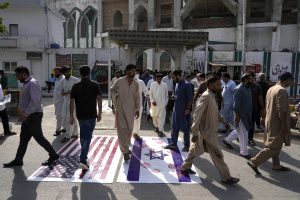On October 7, the Palestinian militant group Hamas launched an unprecedented attack on Israel. Hamas militants entered Israeli communities near the Gaza Strip, killed hundreds of people, and took dozens of hostages. This is Hamas’ most ambitious strike against Israel launched from Gaza.
Israel declared war against Hamas and has counter-attacked Gaza Strip and Hamas bases with airstrikes. It has called for a complete seizure of Gaza. Israeli Prime Minister Benjamin Netanyahu vowed to destroy Hamas and warned that the offensive against the group would continue “without reservation and without respite.”
Over 2,900 people have died within a week of the conflict. Scores of foreigners are among the victims.
Though geography separates the conflict zone from South Asia, the violence has impacted the region directly and indirectly. Only four of the eight countries in the region — Nepal, India, Sri Lanka, and Bhutan — have diplomatic ties with Israel.
Ten Nepali citizens have died in the attacks, with hundreds of others taking shelter in bunkers. On October 12, Nepal air-lifted 253 citizens from the war zone. They are students who were “learning and earning” in Israel. Kathmandu is preparing the logistics to bring back the bodies of the 10 victims.
Similarly, India is preparing for “Operation Ajay” to facilitate the return from Israel of Indian citizens.
The early responses of the countries from the region are revelatory.
Indian Prime Minister Narendra Modi wrote on X (formerly Twitter) that he was “deeply shocked by the news of terrorist attacks in Israel.” He expressed solidarity with Israel. New Delhi’s ties with Tel Aviv have improved by leaps and bounds in recent years. Since India established diplomatic relations in 1992, defense and trade ties quickly improved. Israel is now India’s second-largest defense partner. Modi and Netanyahu’s ethnonational and anti-Muslim ideology has drawn the two countries closer.
Modi’s statement shows how far India-Israel relations have improved since the Cold War, during which India championed the Palestinian cause. However, the Ministry of External Affairs (MEA) stated that there has been no change in policy. In a regular media briefing, MEA Spokesperson Arindam Bagchi said India advocated for a “sovereign, independent, and viable state of Palestine… at peace with Israel.”
Nepal, too, strongly condemned the terrorist attack and conveyed solidarity with the government of Israel. Nepali Prime Minister Pushpa Kamal Dahal expressed unwavering commitment to peace for the Palestinian people during his recent speech at the 78th United Nations General Assembly in New York. Kathmandu was among the first nations to have diplomatic ties with Israel but has consistently supported a two-state solution. Nepal has also condemned terrorist activities and does not support Hamas or its actions.
Sri Lanka was deeply concerned about the attacks and the escalation of violence, and called for an immediate end to the hostilities. Colombo said it was committed to a “negotiated settlement in line with internationally agreed parameters of two states… based on the 1967 borders.”
Pakistan stated it is “monitoring the unfolding situation in the Middle East.” It called for establishing a “viable, sovereign, and contiguous State of Palestine.”
Meanwhile, Bangladesh strongly condemned the ongoing armed conflict. However, it warned Israel that “living under Israeli occupation and forced settlements in Palestinian territory will not pave the way for peace.” Dhaka reiterated that the two-state resolution is a viable solution.
Taliban-led Afghanistan went further to allege that the conflict was “the result of Israeli Zionists trampling on the rights of the oppressed Palestinian people and repeated insults and disrespect to Muslim holy places.”
There is a clear divide over the views of South Asian countries on Hamas.
India and Nepal referred to the group as terrorists. Meanwhile, the Muslim-majority countries in the region, none of which have diplomatic ties with Israel — Pakistan, Bangladesh, Afghanistan, and Maldives — have avoided blaming Hamas, expressed sympathy, or supported its actions outright.
Thousands of people in Bangladesh and Pakistan marched to show solidarity with the Palestinians.
South Asian countries, whether they have diplomatic ties with Israel or not, are mostly unanimous in their view that the only viable solution is the establishment of two states living at peace with each other. They support the statehood of the Palestinian people. However, South Asian governments differ in the specifics of what that would entail.
Nevertheless, Hamas’ activities alongside realpolitik considerations (improving ties with Israel) have made some countries less sympathetic to Hamas, even if they support Palestinian statehood. If such attacks continue, Hamas might find even less support among the non-Muslim countries in South Asia.

































